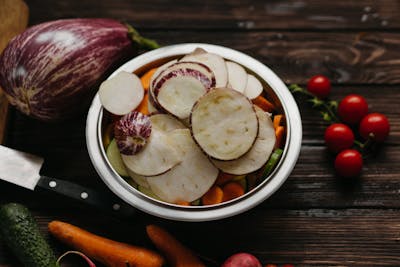Adopting a vegetarian diet can be an effective strategy for weight loss, thanks to its emphasis on nutrient-dense, low-calorie foods. Here’s a guide to help you navigate this plant-powered path and make the most of your vegetarian diet.
Is a Vegetarian Diet Good for Weight Loss?
Absolutely! Vegetarian diets can be very effective for weight loss due to several factors:
- High in Fiber: Fruits, vegetables, whole grains, and legumes are rich in fiber, which helps you feel fuller longer and supports healthy digestion.
- Low in Calories: Plant-based foods tend to be lower in calories compared to many animal products, which can help create a calorie deficit for weight loss.
- Nutrient-Dense: Vegetables, fruits, and legumes are packed with essential nutrients while being relatively low in calories.
Vegetarian Weight Loss Tips
1. Focus on Whole Foods:
- Prioritize fresh fruits, vegetables, whole grains, legumes, and nuts. These foods are not only filling but also packed with nutrients.
2. Control Portion Sizes:
- When ingested in excess, even healthful meals can cause weight gain. Consider portion sizes while trying to control how many calories you eat.
3. Include Lean Protein:
- Make sure you consume adequate plant-based protein. Options include tofu, tempeh, lentils, chickpeas, and beans, which help maintain muscle mass and keep you satisfied.
4. Limit Processed Foods:
- Watch out for vegetarian processed foods, such as certain meat substitutes, which can be high in unhealthy fats, sodium, and added sugars.
5. Stay Hydrated:
- Drinking plenty of water aids in digestion, helps control appetite, and supports overall metabolism.
Vegetarian Meal Ideas for Weight Loss
Breakfast:
- Oatmeal: Top with fresh berries, nuts, and a sprinkle of chia seeds.
- Tofu Scramble: Cook with vegetables like spinach, peppers, and onions for a hearty start.
- Avocado Toast: Use whole-grain bread and top with avocado and a sprinkle of seeds.
Lunch:
- Lentil Soup: Pair with a slice of whole-grain bread for a filling meal.
- Chickpea Salad: Combine with mixed greens, tomatoes, cucumbers, and a light vinaigrette.
- Vegetable Stir-Fry: Serve with brown rice and a serving of tofu or tempeh.
Dinner:
- Roasted Vegetable Curry: Enjoy with brown rice or quinoa.
- Quinoa Bowl: Load with grilled vegetables, hummus, and a sprinkle of seeds.
- Lentil Loaf: Pair with a side of sweet potato mash for a satisfying meal.
Snacks:
- Fruits: Apples, berries, or a banana.
- Vegetables: Carrot sticks, bell pepper slices, or cucumber.
- Nuts and Seeds: Almonds, walnuts, or chia seeds.
- Greek Yogurt: Choose a plant-based version or low-fat Greek yogurt.
- Hummus with Whole-Grain Pita: A tasty and filling option.
Common Vegetarian Diet Mistakes
1. Skipping Protein:
- Make sure to include sufficient protein from plant-based sources to avoid feeling fatigued or losing muscle mass.
2. Overreliance on Processed Foods:
- Opt for whole foods rather than heavily processed vegetarian options to avoid excess sugars and unhealthy fats.
3. Neglecting Healthy Fats:
- Include sources of healthy fats like avocados, nuts, and seeds to support overall health and satiety.
4. Not Planning Meals:
- Planning and prepping meals can help you stay on track and avoid unhealthy choices.
Challenges and Solutions
1. Variety is Key:
- Experiment with different vegetables, grains, and legumes to keep meals interesting and prevent dietary monotony.
2. Cook at Home:
- Preparing your own meals gives you control over ingredients and portion sizes, making it easier to stick to healthy eating.
3. Find a Support System:
- Connect with other vegetarians through online communities or local groups for support and recipe ideas.
4. Don’t Be Afraid to Experiment:
- Try new recipes and cooking techniques to keep your diet enjoyable and diverse.
Conclusion
A vegetarian diet can be a powerful tool for weight loss when approached thoughtfully. Focus on whole foods, manage portion sizes, and include a variety of nutrient-dense options. Remember, sustainable weight loss involves gradual changes and a balanced lifestyle. With dedication and the right approach, you can achieve your weight loss goals while enjoying the health benefits of a plant-based diet.
